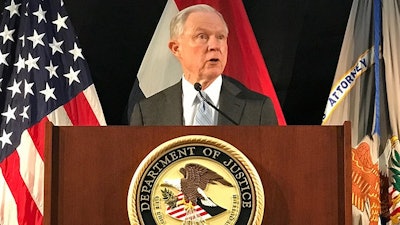
May 5, President Trump signed the current federal budget bill, which included an extension of the Rohrabacher-Farr Amendment’s coverage—forbidding the use of federally appropriated funds to interfere with state-authorized medical marijuana programs—through September 2017.
RELATED: 9 Government Agency Stances That Could Impact Your Bottom Line
This week, however, Attorney General Jeff Sessions called on congressional leaders to reconsider their support of the amendment. In a letter—which was made public this week (first by Tom Angell of MassRoots and verified by The Washington Post)—to Senators Mitch McConnell and Charles Schumer, Speaker Paul Ryan and Representative Nancy Pelosi, Sessions wrote:
“I write to renew the Department of Justice’s opposition to the inclusion of language in any appropriations legislation that would prohibit the use of Department of Justice funds or in any way inhibit its authority to enforce the Controlled Substances Act (CSA).
As you know, the most recent continuing resolution contained a rider that restricts the Department from using appropriated funds to prevent certain states ‘from implementing their own State laws that authorize the use, distribution, possession, or cultivation of medical marijuana,’ even though marijuana remains unlawful under the Controlled Substances Act.”
To gain a better understanding of what the Attorney General’s letter may mean to medical cannabis businesses, as well as explore the chances that the Rohrabacher-Farr Amendment will become obsolete, Cannabis Business Times Editor Noelle Skodzinski talked with Steve Fox, director of VS Strategies (an affiliate of marijuana law firm Vicente Sederberg), which is focused on lobbying and advocacy. Fox has personally been involved in marijuana lobbying at the federal level since 2002.
Noelle Skodzinski: What do you think the likelihood is that the amendment will be “undone” as Sessions is requesting?
Steve Fox: We are optimistic that the appropriations bill passed by Congress will ultimately include the medical marijuana amendment. There have been strong majorities in both the House and Senate in favor of the amendment. And public support for medical marijuana and state marijuana laws is overwhelming. Attorney General Sessions’ opinions on this topic are well known. But we feel that members of Congress will respect the will of their constituents and the American public.
NS: What process would be involved in the process of removing the Rohrabacher-Farr Amendment?
SF: Removing the Rohrabacher-Farr Amendment is not a difficult process. It is up to Appropriations Subcommittee chairpersons to determine whether the language is included in the Fiscal Year 2018 appropriations measures being introduced in the near future. If the language isn’t included, it is then a matter of our allies pushing for votes in committee or on the House floor to add the amendment back in. That is how the amendment came into effect in the first place.
NS: What will the impact on the industry be if it is undone? How fearful should state-legal cannabis cultivation businesses and dispensaries be if this happens?
SF: I do not believe that the elimination of the Rohrabacher-Farr Amendment, on its own, is reason to be fearful. For perspective, the Rohrabacher-Farr Amendment only applies to state medical marijuana laws. That means that it does not apply to adult-use markets in states like Colorado, Washington, Oregon and Alaska. Yet the Department of Justice has, to this point, still demonstrated respect for those state laws. So, while we will see how the Department of Justice policy evolves in the coming months, it is possible to have noninterference without the Rohrabacher-Farr Amendment in place.
NS: Is there anything the industry can do to help prevent the undoing of the amendment?
SF: If there are state-legal operators interested in being helpful, they should reach out to their U.S. senators and representatives to urge them to support the Rohrabacher-Farr Amendment, as well as the McClintock-Polis Amendment that would protect all state marijuana laws. It is important that members of Congress realize that there are business owners in their districts creating jobs, generating tax revenue and spurring economic activity.
NS: Is there anything I haven’t asked that you think is important to address?
SF: The most fundamental message for operators in the cannabis industry is that it is critical that they operate in full compliance with state laws. The Department of Justice is clearly concerned about people who operate outside of a state’s laws and regulations. Operators should not give the Department any reason to question their adherence with the law.
Photo credit: Federal Bureau of Investigation











.png?auto=format%2Ccompress&fit=crop&h=141&q=70&w=250)














